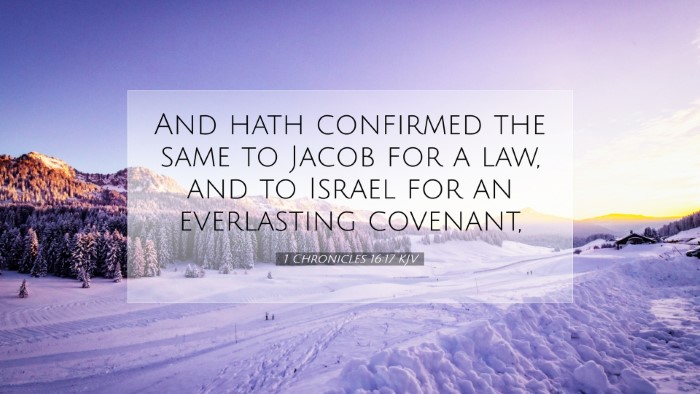Commentary on 1 Chronicles 16:17
Verse: “And hath confirmed the same to Jacob for a law, and to Israel for an everlasting covenant.” (1 Chronicles 16:17)
Introduction
This verse encapsulates key theological themes found throughout the Scriptures. It reflects on God's covenant with Israel, emphasizing His faithfulness and the enduring nature of His promises. Through insights drawn from public domain commentaries, we can unpack the richness of this text.
The Context of the Covenant
In understanding 1 Chronicles 16:17, it is essential to recognize the historical context. This segment of Chronicles recounts the celebration of the Ark's return to Jerusalem, a significant event for Israel as it symbolizes the presence of God among His people. Matthew Henry emphasizes that this reflects God's peculiar relation with Israel, highlighting the importance of worship and reverence for divine presence.
Albert Barnes notes that the references to Jacob and Israel indicate not just the physical descendants but also signify God’s intimate bond with the covenant people, linked to the land and spiritual identity. The names denote different aspects of God's relationship; Jacob representing the nation in its struggles and formation, while Israel denotes its victory and purpose.
The Nature of the Covenant
The phrase "for a law" strengthens the notion of divine governance. Adam Clarke elaborates on this by noting that God's covenant serves not only as a promise but as a binding agreement that outlines the expectations and guidance for Israel's life. This law integrates moral, civil, and ceremonial dimensions, emphasizing the holistic nature of God's expectations for His people.
Furthermore, the term "everlasting covenant" underscores the concept of permanence in God's dealings. As Matthew Henry points out, this covenant is not temporal; it persists through generations. It assures Israel of God's unceasing commitment, which should evoke trust and obedience in the heart of every believer.
Theological Reflections
This verse prompts significant theological reflection on the character of God. The assurance of an "everlasting covenant" speaks to God's unchanging nature. Both Henry and Barnes underscore that God's promises are not contingent upon human actions; He is faithful even when men fail. This aspect is crucial for pastors and theologians, as it provides a foundation for understanding grace and faithfulness through the narrative of redemption.
Additionally, this covenant is a precursor to the New Covenant established through Jesus Christ. The enduring nature described can be seen through the lens of redemption history. Clarke indicates that God’s dealings with Israel foreshadow a universal application of His covenant love through Christ, which includes all who believe.
Practical Applications
Understanding 1 Chronicles 16:17 extends beyond historical interpretation; it carries practical implications for modern believers. This verse calls pastors and students to reflect on the nature of their own covenants with God. Just as God established a law with Israel, so Christians are called to live according to the teachings of Scripture and the example of Christ.
Furthermore, the assurance of God’s everlasting covenant can foster hope amid uncertainties. As believers grapple with life’s challenges, reflecting on God’s faithfulness becomes a source of strength and encouragement. Henry articulates that acknowledging God’s promises in prayer and worship strengthens the believer’s resolve in faith.
- Encouragement in Trials: The knowledge of an everlasting covenant can bring encouragement during trials, reminding believers of God’s faithful presence.
- Commitment to God’s Law: Believers are called to commit to God’s moral and spiritual directives, aligning their lives with His will.
- Hope in Christ: The New Covenant in Christ is a fulfillment of God’s promise, offering grace and eternal life to all who believe.
Conclusion
In summary, 1 Chronicles 16:17 profoundly illustrates the enduring nature of God's covenant with His people and highlights significant theological themes of faithfulness, law, and grace. For pastors, students, theologians, and biblical scholars, this verse exemplifies the rich tapestry of God's covenantal relationship with His people, inviting deeper reflection on the implications for life and ministry today. As believers continue to explore the meanings of God's promises, they uncover a wellspring of hope and motivation to live faithfully under the guiding principles of His law.


